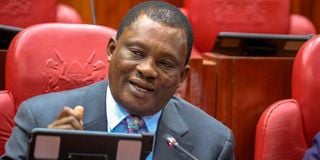Premium
AG Muturi, ODPP oppose Anti-Corruption Bill

Attorney General Justin Muturi.
What you need to know:
- The bill is sponsored by Mbeere North MP Geoffrey Ruku.
- It proposes administrative measures rather than criminal prosecution for corruption-related offences in public procurement.
- The Bill is expected to go for a second reading in Parliament.
Attorney General Justin Muturi and Director of Public Prosecutions Renson Ingonga have rejected a proposal to repeal anti-corruption laws to allow for administrative action instead of criminal prosecution for corruption-related offences in procurement.
The bill, sponsored by Mbeere North MP Geoffrey Ruku, proposes the repeal of the Anti-Corruption and Economic Crimes Act (ACECA) of 2003, which deals with procurement offences relating to non-compliance with procurement guidelines and the implementation of unplanned projects.
It proposes that offences relating to these two sections are administrative matters and should therefore be dealt with through administrative action. It also seeks to delete from the law an offence relating to the initiation of unplanned projects in national and county governments.
In a submission to the National Assembly's Justice and Legal Affairs Committee, chaired by Tharaka MP George Murugara, Attorney General Justin Muturi's office said the bill was not in line with the country's international commitments to strengthen the fight against corruption.
“Corruption has been flagged as an existential threat to our socio-economic development by the President and heads of other arms of government and any legislative proposals clawing back on gains in the fight against corruption should not be adopted by Parliament,” read the submissions.
Mr Muturi's office also argues that the proposed amendment removes procurement and fraud offences from corruption and economic crimes.
"The proposed amendment removes procurement and fraud malpractices from the ambit of corruption and economic crimes. As a result, public officials who misappropriate public funds through procurement will not be subject to the provisions calling for the suspension of public officials charged with corruption and economic crimes," the submissions read.
DPP Ingonga's office said the proposed legislation seeks to undo the accountability structures already put in place by the Anti-Corruption Act.
“We are of the considered view that the mischief that the law intends to address is that of accountability for public resources. The implication of deleting the said sections will give institutions the freedom to divert to unknown projects that may not pass the suitability test for use of public resources,” read ODPP submissions before the committee.
The Ethics and Anti-Corruption Commission (EACC), through Director of Legal Services David Too, said the proposal will open a floodgate of corruption in the country, given that the procurement of goods and services by the government accounts for a huge proportion of public funds.
“Public procurements account for 10 percent to 13 percent of GDP. Investigations by the Commission have consistently demonstrated that procurement entails a process where acts of omission or commission at every stage contribute to the eventual outcome/award of tenders. The commission has, on numerous occasions, recommended prosecution based on procurement breaches resulting in convictions for corruption.” EACC said.
Mr Murugara, who chaired the sitting, said the committee would go back to harmonise the submissions made by the independent bodies and make a recommendation to the National Assembly.
The Bill is expected to go for a second reading in Parliament.
Corrupt practices in procurement such as bribery, kickbacks, fraud, extortion, conflict of interest, poor contract management, procurement of substandard goods and services, biased tender evaluation and awarding contracts to oneself through proxies are some of the common forms of corruption in the country, according to the EACC.
The commission has also said it has been able to recover billions of shillings in public resources by initiating criminal proceedings after detecting and investigating flawed procurement processes in both county and national government.





